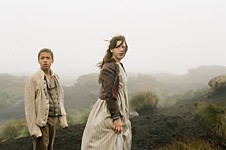
Bird
2024, R, 118 min. Directed by Andrea Arnold. Starring Nykiya Adams, Franz Rogowski, Barry Keoghan, Jason Buda, Jasmine Jobson, James Nelson-Joyce, Frankie Box, Rhys Yates, Joanne Matthews, Sarah Harber.
REVIEWED By Kimberley Jones, Fri., Nov. 29, 2024
Fish Tank’s snarling, ungovernable Mia, preyed upon by an older man. Wuthering Heights’ wild Heathcliff and Catherine, flinching from violence and licking open wounds. The feral teens of American Honey, scooped up by an unscrupulous pack leader. If there’s a through line to Andrea Arnold films, it’s how close to the animal kingdom – to some ancient shared DNA – her characters feel. Pushing the conceit further, her last film, the 2021 biographical documentary Cow, was about an actual animal.
As for Bird, Arnold’s first scripted feature film since 2016 – well, the title’s a dead giveaway, even if we don’t meet the titular character until twentysomething minutes in. Per usual for the fiercely empathetic Arnold, a girl in the gray area between childhood and adulthood is the film’s focal point. First-time actor Nykiya Adams – a bolt from the blue, as electrifying a find as Sasha Lane in American Honey – plays 12-year-old Bailey, a watchful, wary child uncommonly tuned to the frequency of the natural world.
The film opens on Bailey on a bridge with her phone out, recording a bird in flight. Later, she will rewatch this video and others of nature projected on the wall of the flat she shares with her father and brother in a Kent council estate blooming with graffiti. (“Don’t You Worry” reads one felt-tipped graffito; “Cameron Fucks Pigs,” another.) Dad is the wild, grinning Bug (Saltburn breakout Keoghan), tatted in homage to his name, a centipede winding its way up his chest to his cheek. Bug’s latest get-rich-quick scheme is a toad with supposed hallucinogenic slime capabilities. A neighbor downstairs walks around with a snake around her neck. Five minutes from home, Bailey falls asleep in a field and wakes up to horses nudging at her. That’s another gray area the film lives in: the one between pastoral and urban, human and animal. Bailey with her camera is the bridge.
It’s in that same field that first appears Bird (Passages’ Rogowski). Bird is an odd one – an adult man yet seeming naif who carries himself strangely and is looking for an absent mother – yet he and Bailey forge a surprising connection. If you’ve seen other Arnold films, alarm bells might reasonably clang at the weirdo in his 30s making friends with a preteen, but Rogowski – playing Bird as gentle and wondering but wounded – unnerves in a different way, one without menace: He makes you think there might be magic in this world.
Grim magic (or Grimm, I suppose): Bird goes to dark, unhappy places, and brave Bailey carries far too much for a child. But Arnold – a Kent native herself – doesn’t coddle or tut about the underparented children in her films; they have dreams, and they have agency. Whether you should read the magical elements as literal is up to interpretation. (If there’s a tell, I didn’t catch it; DP Robbie Ryan – a true-blue Arnold collaborator, also twice Oscar nominated for his work on Yorgos Lanthimos’ pictures – shoots the quotidian as beautiful and the magical as matter of fact.) What struck me more was the film’s interpretation of Bailey’s coming of age not as something to be mourned or that comes on too soon. Instead, it’s an activation.
A note to readers: Bold and uncensored, The Austin Chronicle has been Austin’s independent news source for over 40 years, expressing the community’s political and environmental concerns and supporting its active cultural scene. Now more than ever, we need your support to continue supplying Austin with independent, free press. If real news is important to you, please consider making a donation of $5, $10 or whatever you can afford, to help keep our journalism on stands.
Kimberley Jones, Oct. 19, 2012
June 6, 2025
June 6, 2025
Bird, Andrea Arnold, Nykiya Adams, Franz Rogowski, Barry Keoghan, Jason Buda, Jasmine Jobson, James Nelson-Joyce, Frankie Box, Rhys Yates, Joanne Matthews, Sarah Harber









